
Nine men's morris is a strategy board game for two players dating at least to the Roman Empire. The game is also known as nine-man morris, mill, mills, the mill game, merels, merrills, merelles, marelles, morelles, and ninepenny marl in English. In North America, the game has also been called cowboy checkers, and its board is sometimes printed on the back of checkerboards. Nine men's morris is a solved game, that is, a game whose optimal strategy has been calculated. It has been shown that with perfect play from both players, the game results in a draw.
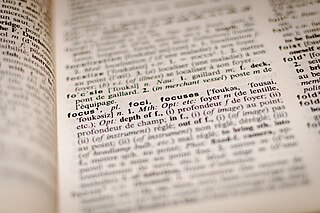
Fictionary, also known as the Dictionary Game or simply Dictionary, is a word game in which players guess the definition of an obscure word. Each round consists of one player selecting and announcing a word from the dictionary, and other players composing a fake definition for it. The definitions, as well as the correct definition, are collected blindly by the selector and read aloud, and players vote on which definition they believe to be correct. Points are awarded for correct guesses, and for having a fake definition guessed by another player.

Balderdash is a board game variant of a classic parlour game known as Fictionary or the Dictionary Game. It was created by Laura Robinson and Paul Toyne of Toronto, Ontario, Canada. The game was first released in 1984 by the Canada Games Company. A US edition appeared that year from TSR, Inc., copyrighted to Gameworks Creations, Inc. and licensed from Canada Games. Subsequent editions have appeared from a variety of companies including The Games Gang, Hasbro and Mattel. The game has sold over 15 million copies worldwide to date. It is aimed at fans of word games, such as Scrabble.
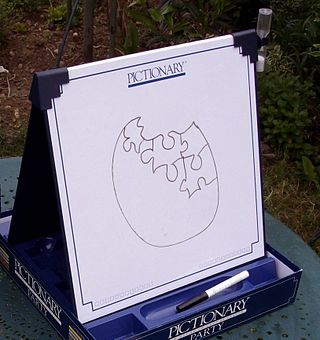
Pictionary is a charades-inspired word-guessing game invented by Robert Angel with graphic design by Gary Everson and first published in 1985 by Angel Games Inc. Angel Games licensed Pictionary to Western Publishing. Hasbro purchased the rights in 1994 after acquiring the games business of Western Publishing. Mattel acquired ownership of Pictionary in 2001. The game is played in teams with players trying to identify specific words from their teammates.

Missile Command is a 1980 shoot 'em up arcade video game developed and published by Atari, Inc. and later licensed to Sega for Japanese and European releases. It was designed by Dave Theurer, who also designed Atari's vector graphics game Tempest from the same year. The game was released during the Cold War, and the player uses a trackball to defend six cities from intercontinental ballistic missiles by launching anti-ballistic missiles from three bases.

Taboo is a word, guessing, and party game published by Parker Brothers in 1989. The objective of the game is for a player to have their partners guess the word on the player's card without using the word itself or five additional words listed on the card.
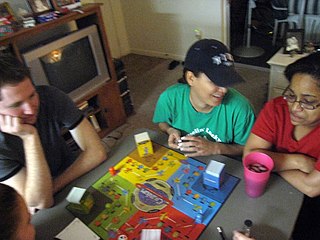
Cranium is a party game created by Whit Alexander and Richard Tait in 1998. Initially, Cranium was sold through Amazon.com and the Starbucks coffee chain, then-novel methods of distribution. After selling 44 million copies of Cranium and its sister titles, the game's manufacturer Cranium, Inc. was bought by Hasbro, Inc. for $77.5 million in 2008. Billed as "The Game for Your Whole Brain", Cranium includes a wide variety of activities, unlike many other party games. Murray Brand Commuications and brand strategist, Sonali Shah handled packaging and branding for the game, and the artwork is by cartoonist Gary Baseman.

Lingo is an American television game show with multiple international adaptations. Contestants compete to decode five-letter words given the first letter, similarly to Jotto. In most versions of the show, successfully guessing a word also allows contestants to draw numbers to fill in a Bingo card.
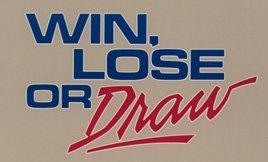
Win, Lose or Draw is an American television game show that aired from 1987 to 1990 in syndication and on NBC. It was taped at CBS Television City, often in Studios 31, 33, and 43 at various times. It was co-produced by Burt & Bert Productions and Kline & Friends for Disney's Buena Vista Television. It has also had two versions on The Disney Channel: Teen Win, Lose or Draw from 1989 to 1992, and a revived version known as Disney's Win, Lose or Draw which aired in 2014. New York described Win, Lose or Draw as "a knockoff" of the board game Pictionary, however, Burt Reynolds and Ed McMahon referred to playing the game at Burt's home during the August 2, 1978 episode of The Tonight Show Starring Johnny Carson, three years before Pictionary was created.

Catch Phrase is a word guessing party game commercially available from Hasbro.
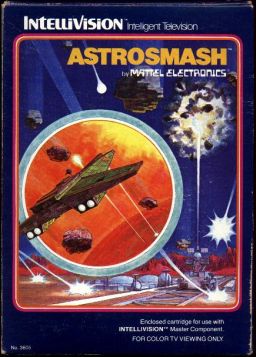
Astrosmash is a fixed shooter video game for the Intellivision console, designed by John Sohl, and released by Mattel Electronics in 1981. The player uses a laser cannon to destroy falling meteors, bombs, and other targets.
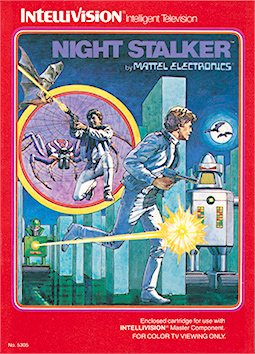
Night Stalker is a top-down maze shooter designed by Steve Montero and released for the Intellivision console in 1982. Night Stalker was ported to the Atari 2600 as Dark Cavern and released under Mattel's M Network label. Apple II, IBM PC, and Mattel Aquarius versions were published in 1983.

Dixit, is a French board game created by Jean-Louis Roubira, illustrated by Marie Cardouat, and published by Libellud. Using a set of cards illustrated with dreamlike images, players select cards that match a title suggested by the designated storyteller player, and attempt to guess which card the storyteller selected. The game was introduced in 2008. Dixit won the 2010 Spiel des Jahres award.
Family Game Night is an American television game show based on Hasbro's family of board games and EA's video game franchise of the same name. The show was hosted by Todd Newton. Burton Richardson was the announcer for the first two seasons; he was replaced by Stacey J. Aswad in the third season, and Andrew Kishino was hired for the fourth season. The 60-minute program debuted on October 10, 2010, on The Hub ; it was previewed on October 9, 2010, on its sister channel, TLC. Seasons 1 and 2 contained 26 and 30 episodes respectively. Seasons 3, 4 and 5 each contained 15 episodes. Season 2 premiered on Friday, September 2, 2011, with additional games being added. The games added to the second season included Cranium Brain Breaks, Green Scream, Ratuki Go-Round, Simon Flash, Operation Sam Dunk, Trouble Pop Quiz, and Spelling Bee. However games from the previous season were still kept.
Time's Up is a charades-based party game designed by Peter Sarrett, and published by R&R Games, Inc., a Tampa, Florida–based manufacturer of tabletop games and party games. The first edition of the game was published in 1999, with the most recent edition, Time's Up! Deluxe, published in 2008. It is a game for teams of two or more players, and is played in three rounds. Time's Up! is based on the classic parlour game known as Celebrity.

Concept is a deduction party board game released in 2013. The game was designed by Alain Rivollet and Gaëtan Beaujannot and published by Repos Production. It has collected multiple awards and nominations including the Jeu de l'Année prize in Cannes in 2014.
Fireside Games is a US based board game publishing company owned and operated by Justin De Witt and Anne-Marie De Witt. Based in Austin, Texas, the company was founded in 2007. They published their first game, Castle Panic in 2009, and have published several expansions and sequels as well as other titles since then.

The Intellivision Amico is a planned home video game console being developed and marketed by Amico Entertainment. It was originally slated to be released in October 2020, but repeated delays followed, leaving the console without a release date.
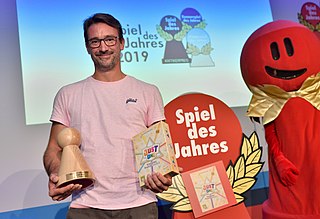
Just One is a cooperative party game for 3 to 7 players, designed by Ludovic Roudy and Bruno Sautter and published by Repos Production in 2018. In each round of the game, players write down a one word clue for the round's guesser, who must figure out the secret word for the round. Identical clues are discarded before the guesser sees them.
















